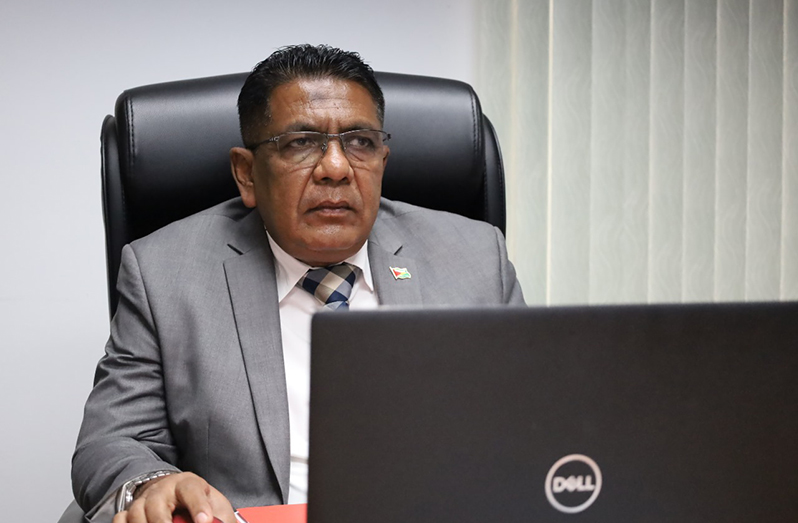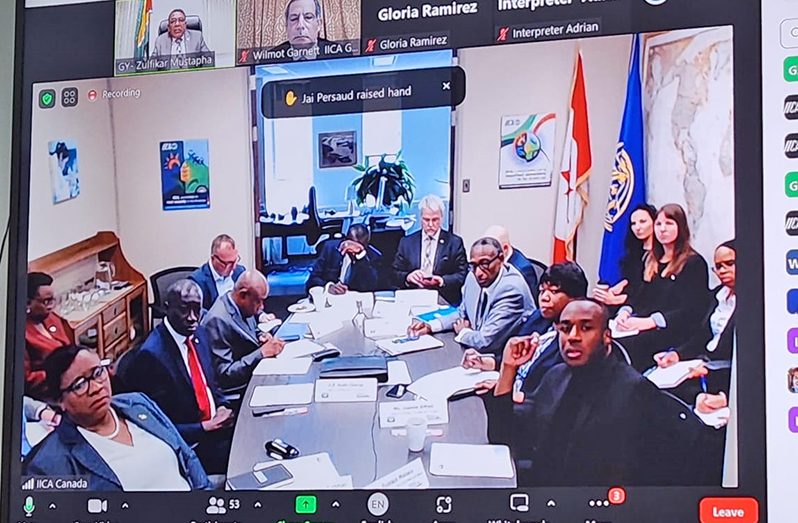Minister Mustapha tells stakeholders during CARICOM-Canada Policy Forum
AGRICULTURE Minister Zulfikar Mustapha, on Thursday, delivered the keynote address at the fourth CARICOM-Canada Policy Forum.
The hybrid event was organized by the CARICOM heads of the diplomatic mission in Canada, in collaboration with the IICA Delegation in Canada under the theme, “CARICOM: Food Security in a Climate-Challenged World”.
While acknowledging that food insecurity is increasing in many countries across the Caribbean, the forum allowed the officials to discuss measures and policies intended to confront current and future food insecurity, in addition to promoting family farming and climate-resilient agriculture in the Americas
While delivering the keynote address, Minister Mustapha said food security is a fundamental pillar of prosperity for CARICOM that rests on four crucial dimensions and that a key aspect of transforming Guyana’s agri-food systems was boosting agricultural development in rural communities.
“Food security remains a fundamental pillar of prosperity for CARICOM, and it rests on four crucial dimensions which include availability, access, utilization, and stability, to ensure that every citizen in our Region enjoys safe, nutritious, and affordable food, regardless of their socioeconomic status. The Caribbean must aim at becoming more food-secure.
This exercise must be sustained and must involve increased production of foods consumed within the Region, thereby boosting agricultural development in rural communities, especially the hinterland (in Guyana). These communities are the most vulnerable to the effects of climate change, especially since their livelihoods often depend on the environment,” he said.
Mustapha added: “We often look to our small-scale farmers to help maintain food security in our respective countries. They are essential players in the agriculture-food system and so, government initiatives to transform agri-food systems are extended to benefit rural communities for climate resilience and accelerated economic growth.

“Guyana’s Low Carbon Development Strategy (LCDS) 2030 was also designed to guide our adaptation and mitigation efforts in the face of climate change. As climate change is considered in all subsectors – crops, livestock, fisheries, and aquaculture, climate actions in the agriculture sector of Guyana have ranged from constructing drainage and irrigation infrastructure; promoting sustainable land, forest and water use; promoting climate-smart agriculture; developing early-warning systems and mangrove reforestation and preservation.”
He also said that the Caribbean continues to be affected by challenges pertaining to the development of a competitive agri-food system.
“The Caribbean Region faces many challenges in developing a competitive agri-food system that can contribute to the achievement of its food security and economic goals. One of these challenges is the Region’s vulnerability to the adverse effects of climate change – rising sea levels, extreme weather events, and other natural disasters. Rising temperatures, extreme weather events, and changing rainfall patterns threaten the availability of crops and fisheries. Prolonged droughts or excessive rainfall can disrupt access to food, making it difficult for vulnerable communities to reach markets or afford basic staples.
“The impact of climate change even extends to affecting the nutritional value of our produce, [and] affecting utilization and overall health. The Government of Guyana has regularly made the call to scale up climate finance to fund national climate adaptation and mitigation initiatives. It is our hope that developed countries will fulfil their pledges and make further efforts to scale up climate finance, and significantly increase finance for adaptation, in line with the priorities expressed by developing countries,” he said.
Meanwhile, during a panel discussion on promoting food security and sustainable agriculture for climate-resilient food systems across CARICOM, Minister Mustapha said that food-security efforts should include increasing accessibility and improving the nutrition of all persons.
“Food security should not stop at increasing production but should be inclusive of increasing accessibility and improving the nutrition of all persons. In ensuring food security, there must be scope for sustainable employment opportunities for youths, women, and other vulnerable groups. This will both generate income and improve livelihoods.
“Guyana, like many of our CARICOM neighbours, understands the urgency of addressing the nexus of food security and climate resilience. Our Region is particularly vulnerable to the impacts of climate change, with rising sea levels, extreme weather events, and shifting rainfall patterns threatening our food supply and livelihoods,” the minister said.
He added: “Agriculture is not just an industry; it’s a way of life for many of our people. It is imperative that the CARICOM Region embrace climate-smart agriculture, which marries traditional farming knowledge with innovative approaches. This includes the use of drought-resistant crop varieties, improved drainage and irrigation techniques, shade house technology, and soil-conservation practices to mitigate the impacts of changing weather patterns.”
Minister Mustapha said it was an opportune time for CARICOM to act decisively as a cohesive unit in order to ensure that countries do not deviate further from our commitment to the SDGs.




.jpg)










